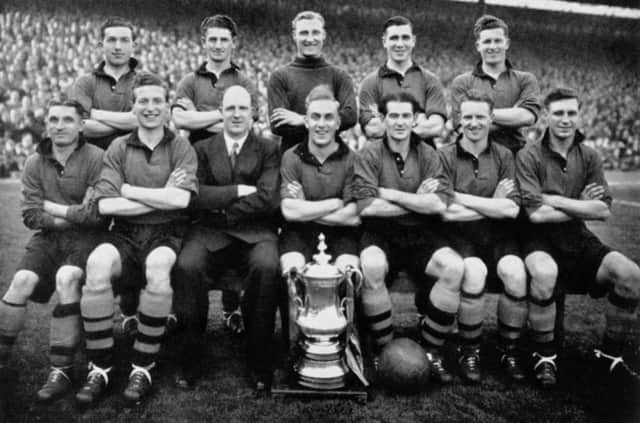Obituary: James Dunn Junior, footballer


JIMMY Dunn Junior was known to only the keenest of Scottish football “anoraks”, but he was in fact Scottish football royalty.
The son of Jimmy Dunn Senior, the inside-right in the iconic “Wembley Wizards” who thrashed England 5-1 in the greatest of Scottish international victories, at Wembley on 31 March, 1928, Jimmy Junior, like his father, would win an FA Cup winner’s medal. The Dunns were the only Scottish father and son combination to have tasted FA Cup glory.
Advertisement
Hide AdAdvertisement
Hide AdJimmy Jnr was born in Edinburgh in 1923, when his father was starring for Hibs. After the 1928 Wembley win, Jimmy Snr was transferred to Everton, with whom he won a League Championship medal in 1932, before scoring the third goal in Everton’s 3-0 FA Cup triumph over Manchester City in 1933. The City team they beat included Matt Busby and Jimmy McMullan.
Growing up in Liverpool, Jimmy Junior quickly lost his Edinburgh accent. He followed his father into football, where his form with St Theresa’s Juniors earned him a place on the Wolves’ ground staff in 1941 and a full professional contract a year later.
He managed to avoid active service during the war – he worked as a railway fireman, which allowed him to clock up more than 100 games for Wolves in the unofficial war-time competitions. He once came straight off the foot-plate to play for Wolves against Birmingham City.
His official first-team debut came against Middlesbrough, in November, 1946, but he was consigned to the reserves, before being re-called for the final two games of the season. The final match of that 1946-47 season has gone down in Wolves’ folklore. It was a winner-take-all Molineux clash between Wolves and Liverpool. Wolves needed only to draw to win the League Championship, whereas, for Billy Liddell and the Reds, nothing else but victory would guarantee the title.
Dunn scored first for Wolves, but two Liverpool goals saw them snatch the title by a single point from Wolves and Manchester United.
The following season, Dunn became a first-team regular as Wolves finished fifth in the League and he was still a regular in season 1948-49, which ended with Dunn and Wolves beating Leicester City 3-1 to win the FA Cup. The son had, therefore, equalled his father’s cup-winning feat. He was the only Scot in the victorious Wolves team, captained by Billy Wright, the England skipper.
A serious injury curtailed Jimmy’s appearances to single figures the following season, but, again he fought back into the first team, before, in November 1952, moving to Derby County.
The Rams were on the slide. Relegation at the end of that season was followed by a fall down the Division Two table in 1953-54. They avoided relegation by a point, but, in season 1954-55, in spite of Dunn finishing as top scorer, Derby were relegated to Division Three North.
Advertisement
Hide AdAdvertisement
Hide AdDunn did not join them in that league, having called time on his senior career by joining non-league Worcester City, before seeing out his playing career with Runcorn.
He then took the well-trodden ex-footballer’s path into running a pub; but this career didn’t satisfy him and he returned to football, as first-team trainer with Wolves’ great Black Country rivals, West Bromwich Albion.
Jimmy left The Hawthorns in 1971 to run the Edgebaston Health Club, next door to the Warwickshire county cricket ground. Here, his sports injury expertise was occasionally called on to work with England’s Test cricketers.
In retirement, Jimmy continued, his dodgy knees notwithstanding, to keep active. He continued to play a fiercely competitive game of tennis into his late 70s, while he also enjoyed golf and satisfying his punter’s instincts on the race course.
His later years were blighted by Alzheimer’s and the loss in 2007 of Muriel, his wife of more than 60 years. Towards the end he was cared for in a nursing home in Bilston, Staffordshire, where was re-united with the great Bert Williams, the goalkeeper in the victorious Wolves cup-winning team of 1949.
The two old friends would sit together in the day room, until Williams died earlier in 2014.
Jimmy Dunn Junior is survived by his sons Philip and Peter, a grandson and a great-grandson.